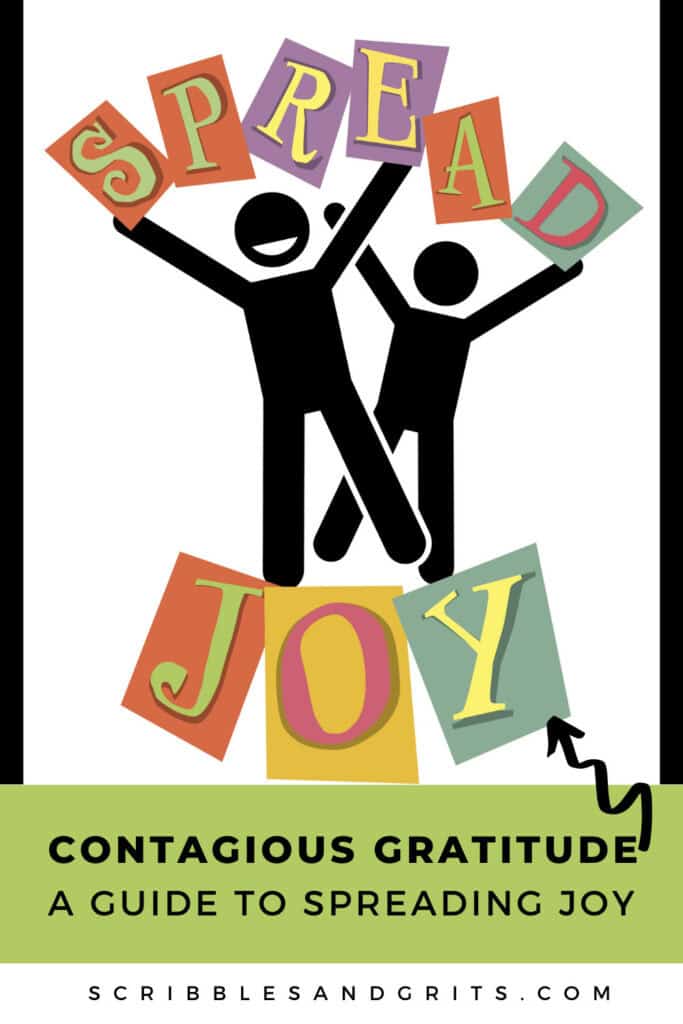Contagious Gratitude: The Gift That Spreads Joy
Have you ever experienced a moment that completely shifted your perspective and left an indelible mark on you?
For me, it was a moment of contagious gratitude that changed everything!
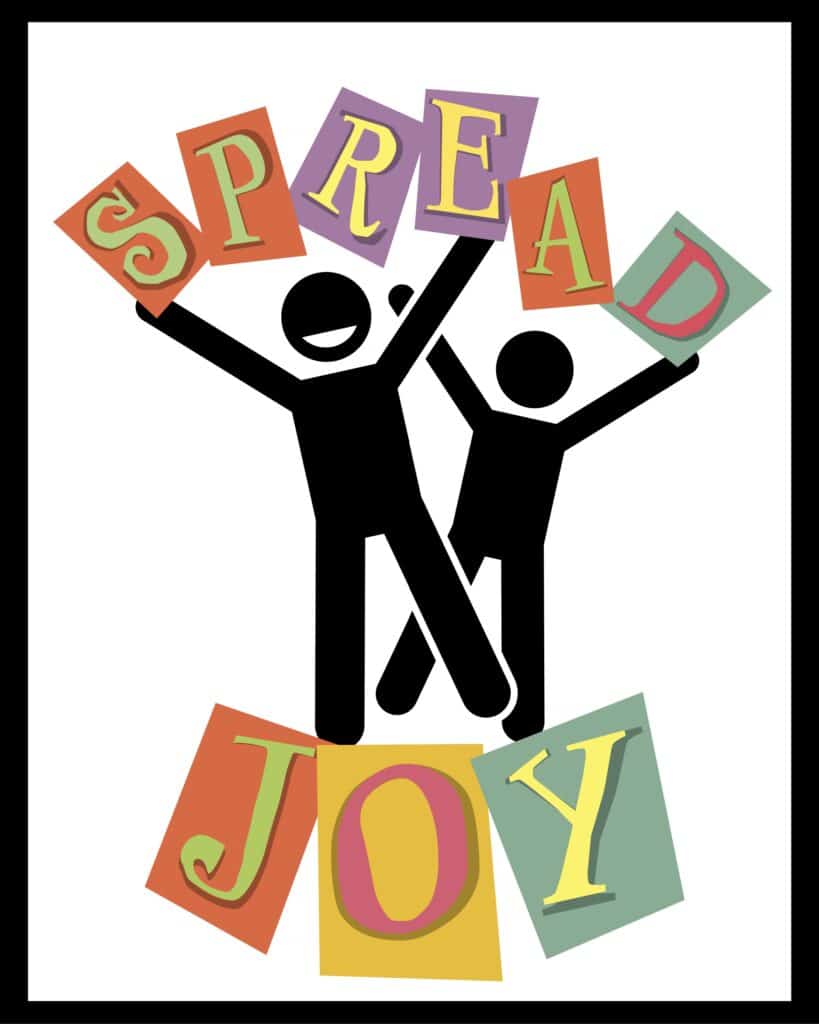
Fresh out of college, my first job was as a “Hospitality Agent” at a Hotel and Convention Center.
One day my boss handed me a letter he had received from a recent hotel guest.
But this wasn’t your average letter – oh no. This was a glowing review of my exceptional service.
That’s the exact moment the contagious gratitude bug bit me!
And three decades later, to this very day . . . Whenever I receive excellent service, I request the manager’s name – and write, email, call, or tell them personally about the outstanding service I was provided.
And I always end with, “Please give [employee’s name] the recognition they deserve.” 😆
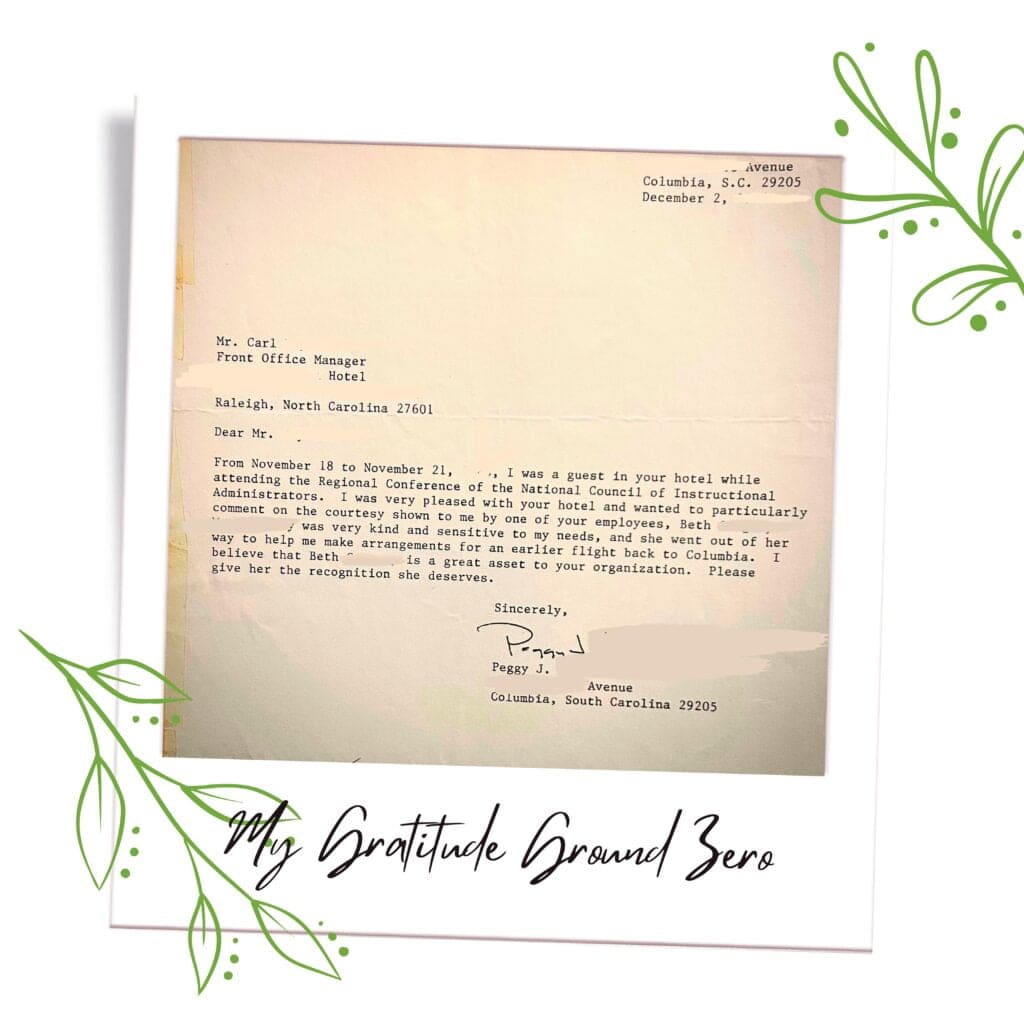
This letter ignited a ripple of gratitude, and I’ve been “paying it forward” ever since.
I love thinking that its impact still resonates today!
So if you’re looking for a way to spread joy, let me introduce you to contagious gratitude!
What Is Contagious Gratitude?
Contagious gratitude refers to the phenomenon in which expressing appreciation can ripple effect, inspiring others to feel and express gratefulness too. This is due to the positive impact that gratitude can have on both the giver and receiver, creating a cycle of thankfulness that can spread throughout a community.
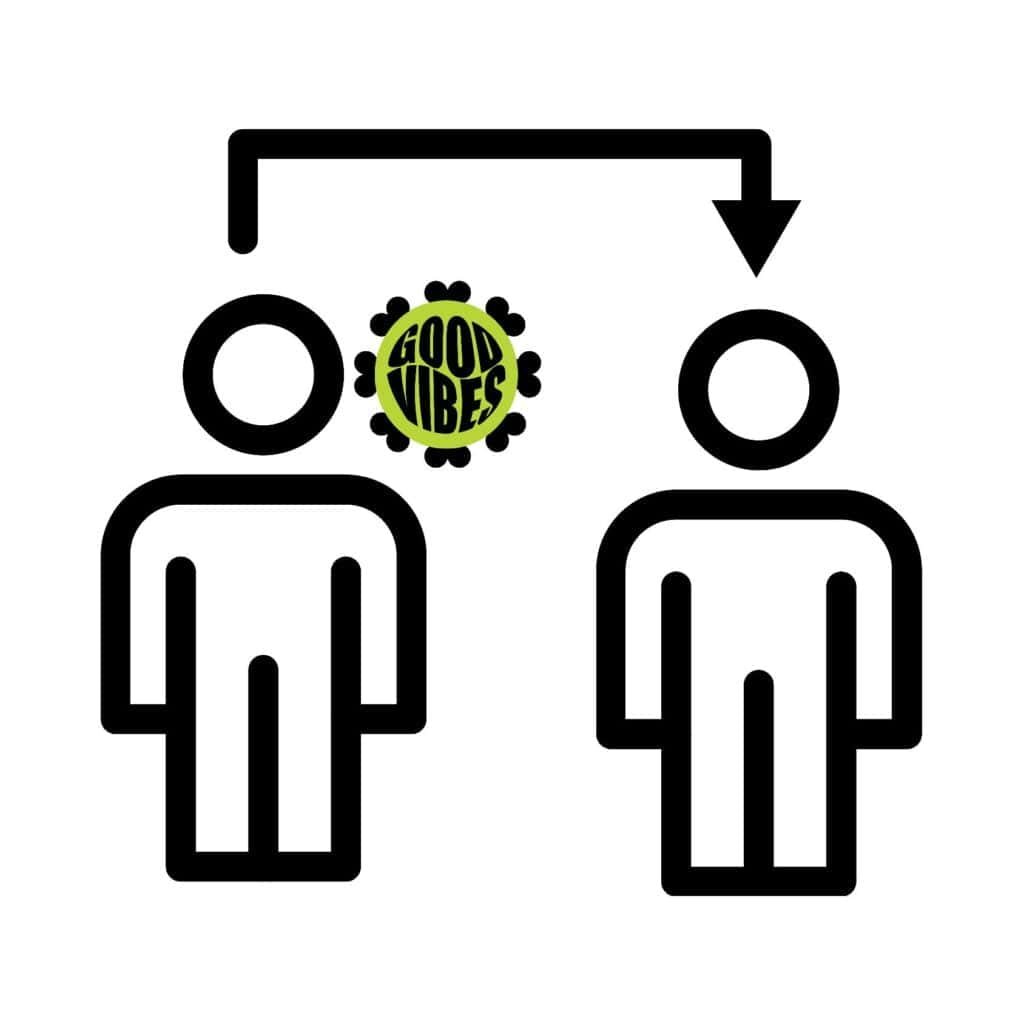
This is like a beautiful chain reaction of good vibes!
The best part is seeing others expressing thankfulness can inspire us to adopt a more grateful mindset. And this can lead to a more positive, appreciative, and kind community.
What Is The Power Of Contagious Gratitude?
The power of contagious gratitude lies in its ability to help us appreciate and feel thankful for the good things in our lives. It reminds us that these positive things often come from sources outside ourselves, such as the people around us, the natural world, or a higher power.
When we embrace gratitude, we become more aware of our connections to others and the world, giving us a sense of purpose and fulfillment. By recognizing that we are part of a more extensive, interconnected web of life, we can experience the transformative power of gratitude in our lives, communities, and even the world.
Infectious gratitude has a multitude of powers. It can revolutionize lives, neighborhoods, and the entire planet.
Read on to learn more about the fantastic benefits; from boosting your overall well-being and resilience to strengthening your social connections and reducing stress and depression, you’ll be amazed at its positive impact on your life.
Why Is The Power Of Gratitude Contagious?
The power of gratitude is contagious because expressing thankfulness and appreciation can create positive emotions in others. Additionally, when we witness someone else expressing gratitude, it can generate similar feelings within us.
Gratitude is a powerful emotion that can positively impact individuals and relationships.
While there is limited research specifically examining the contagion of gratitude, several studies have explored the influence of gratitude on social dynamics and its potential to spread to others.
Relevant Contagion Gratitude Studies
- “The Contagion of Gratitude” by Algoe, Fredrickson, and Gable (2013):
This study examined the emotional contagion of gratitude in social networks. Participants were asked to keep a daily gratitude journal and interact with others. The researchers found that individuals who were exposed to gratitude expressed higher levels of gratitude themselves, and this effect spread through their social networks. - “Emotional Contagion: A Brief Overview and Future Directions” by Herrando and Constantinides (2021):
Although not specific to gratitude, this study talks about “emotional contagion,” the idea that our emotions can spread to others, like how a yawn is contagious. The researchers discovered this could happen through facial expressions, behaviors (like online reviews), and even our bodies physically reacting to someone else’s emotions. They also suggested that we might “catch” emotions from artificial intelligence tools like chatbots in the future. The study recommends using neuroscience tools like brain scans and eye-tracking to understand emotional contagion better, as they can show what’s happening in our brains and bodies in real time, unlike traditional surveys.
While these studies focus on different aspects of gratitude’s contagion, they collectively support the notion that gratitude can spread among individuals and influence their behaviors and emotions.
Keep in mind that research on this topic is still emerging, and further studies may provide additional insights into the contagious nature of gratitude.
More Contagious Gratitude Examples
A teacher expressing gratitude towards a student can inspire that student to work harder and be more confident in their abilities. This can lead to the student achieving more success and inspiring others around them to feel grateful for their own successes.
A group of friends expressing gratitude towards each other can strengthen their bonds and create a sense of community. This can lead to more positive experiences together and new friendships based on the positive energy created by gratitude.
A community expressing gratitude towards their local healthcare workers can boost morale and create a sense of unity. This can lead to more support for those working on the front lines and a greater appreciation for their sacrifices and hard work.
Contagious Gratitude & COVID-19
During the COVID-19 pandemic, the world experienced unparalleled uncertainty, anxiety, and fear. Amid all this chaos, however, there was a glimmer of hope in the form of contagious gratitude.
People came together, virtually and in person, to express gratitude towards healthcare workers, essential employees, and each other. This gratitude manifested in many ways, from small acts of kindness to large-scale fundraisers and donations.
The power of this gratitude was contagious, spreading from one person to another and creating a sense of community and togetherness despite physical distancing measures.
This contagious gratitude not only boosted morale and positivity but also helped to build resilience and inspire hope during a time of great uncertainty.
The COVID-19 pandemic showcased the immense power of contagious gratitude and reminded us of the importance of expressing gratitude towards those around us, no matter the circumstances.
How Is Gratitude Contagious?
Gratitude is contagious because our brains are wired to copy the actions and emotions of people around us. When we see someone being grateful, it’s like a happy bug that spreads to others. When we show gratitude ourselves, it can make others want to do the same, creating a comfortable cycle of good feelings.
To further explain, let me define what I mean by “contagious.” When something is contagious, it can spread from one person to another.
Mirror Neurons
Have you ever noticed how when you see someone else smile, you often can’t help but smile back? That’s because of something called mirror neurons.
These particular brain cells fire when you perform an action and see someone else perform that same action.
So when you witness someone expressing appreciation, your brain might automatically “mirror” that feeling, making you more likely to feel grateful yourself.
Mirror Neurons During Gratitude Diagram
This model illustrates the powerful role of mirror neurons in our social interactions and emotional experiences.
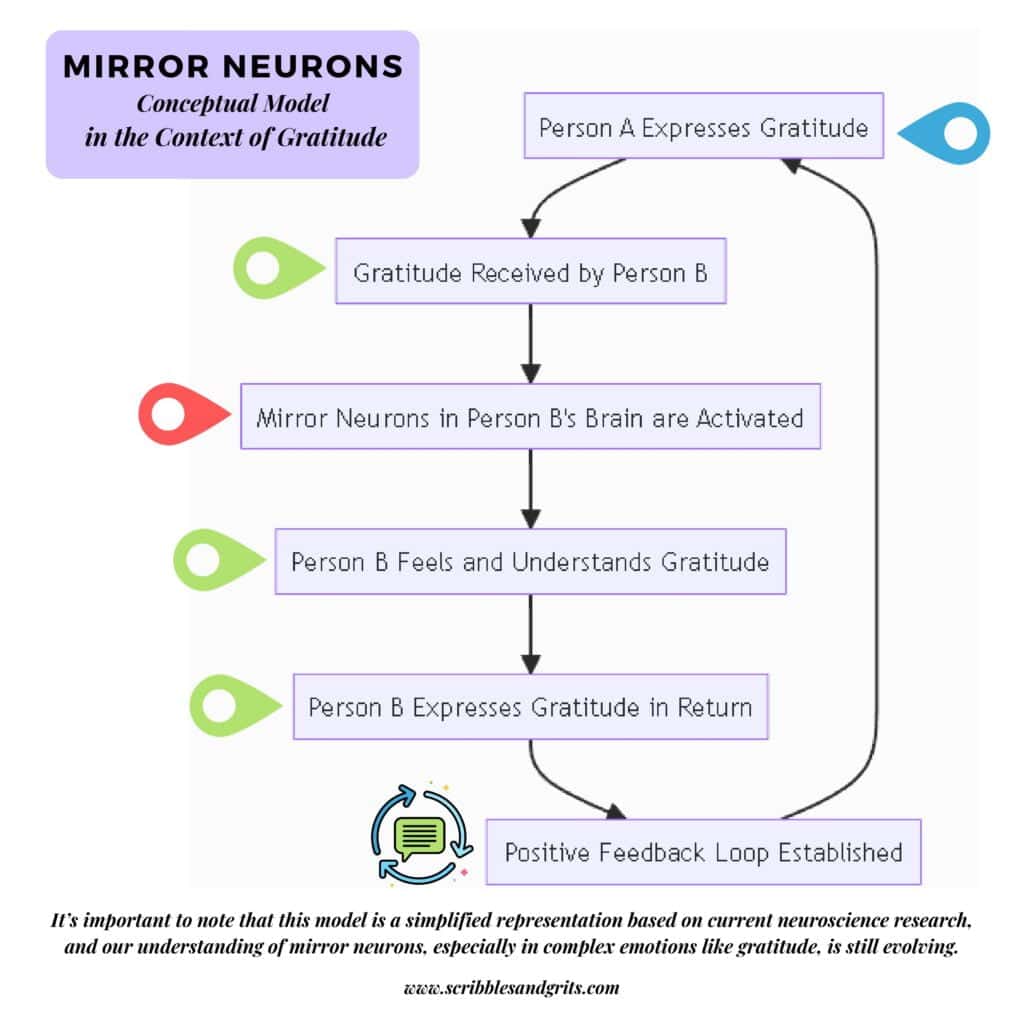
Person A Expresses Gratitude:
The process begins when one person (Person A) expresses gratitude towards another person (Person B). This could be verbal appreciation, a thank you note, a gift, or any other gesture that signifies gratitude.
Gratitude Received by Person B:
Person B receives this expression of gratitude. They hear the words, read the note, or perceive the gesture that Person A has made.
Mirror Neurons in Person B’s Brain are Activated:
Upon receiving the expression of gratitude, mirror neurons in Person B’s brain are activated. Mirror neurons are a type of brain cell that respond equally when we perform an action and witness someone else perform the same action. In this context, they allow Person B to understand and empathize with the feelings of gratitude expressed by Person A.
Person B Feels and Understands Gratitude:
As a result of the activation of mirror neurons, Person B not only understands the gratitude expressed by Person A but also experiences a sense of gratitude. This is because mirror neurons allow us to ‘mirror’ the emotions and actions of others, leading to a deeper understanding and shared experience.
Person B Expresses Gratitude in Return:
Having felt and understood the gratitude expressed by Person A, Person B is likely to express gratitude in return. This could be an immediate response or occur later, but the initial expression of gratitude has set the stage for a reciprocal response.
Positive Feedback Loop Established:
This reciprocal expression of gratitude creates a positive feedback loop. The more gratitude is expressed and shared, the stronger the feelings of gratitude become. This can deepen the relationship between Person A and Person B and fosters a positive social environment where gratitude is valued and freely expressed.
Understanding and harnessing this process can foster more positive and meaningful connections with others.
Social Norms
People are social creatures, and we tend to conform to the standards and expectations of our communities. So if expressing appreciation is seen as a positive behavior in your social group, you may be more likely to adopt it yourself.
And if you show appreciation to others, they may feel more inclined to do the same, creating a positive feedback loop.
Reciprocity
When someone does something nice for us, we often feel a natural urge to reciprocate that kindness. So if someone expresses thankfulness to you, you may feel compelled to respond with an appreciation of your own.
And if you say that to others, they may feel motivated to reciprocate, spreading the positive vibes even further.
Why Gratitude Is So Important
Research has shown that gratitude has the potential to positively affect our well-being in a variety of ways, from elevating our mood to strengthening our connections.
One fascinating study by Jane Tayor Wilson of Westmont College showed how practicing gratitude affects college students’ ability to focus in class and remain resilient when facing challenges while learning.
Here is a further explanation and even more contagious gratitude benefits.
1. Expressing gratitude can improve our mood and overall well-being:
Expressing thankfulness can help improve your mood and decrease depression, reducing stress and anxiety. Gratitude encourages us to focus on the positive rather than dwelling on the negative.
2. Gratitude helps us recognize and appreciate the blessings in our lives
When we express thankfulness, we become more aware of the good things in our lives and develop a deeper appreciation for them. This mindfulness of our blessings can help us feel more content and fulfilled.
3. Gratitude can encourage healthy behaviors
In addition to improving our mental health, being appreciative and thankful can promote positive behaviors such as eating healthy and exercising. When we feel grateful for our bodies and health, we are more motivated to care for ourselves. And better physical fitness leads to a greater sense of well-being.
4. Practicing gratitude is essential for our well-being
Practicing gratefulness throughout the year and showing appreciation for what matters most is critical. This can be as simple as saying “thank you” to someone who has helped you or taking a few minutes each day to reflect on the good things in your life.
5. Gratitude can help strengthen our relationship with others
Showing that we appreciate our loved ones can lead to deeper connections and more positive interactions. A thankful attitude can also help us become more mindful of our words and actions, creating a culture of appreciation.
By making appreciation a regular part of our lives, we can improve our well-being and help spread positivity to those around us.
How To Pay Contagious Gratitude Forward
Volunteer
Giving back to your community is a great way to show gratitude for the blessings in your life.
- You can volunteer at a local soup kitchen, animal shelter, or hospital.
- You can also donate your time to a non-profit organization that supports a cause you are passionate about.
Say Thank You
A simple “thank you” can go a long way to expressing gratitude for help or support. You can also send a thank-you note, a text, or an email to someone who has made a difference in your life.
- Show appreciation to coworkers.
- Show appreciation to friends.
- Show appreciation to family members.
Compliment Others
A kind word can brighten someone’s day and make them feel appreciated. So the next time you see someone do something worthy of praise, take the opportunity to let them know how much you appreciate their efforts.
- At a musical performance, a performer has a fantastic voice. Afterward, you say, “Your voice is so beautiful and powerful! Thank you for sharing your talent with us.”
Random Acts Of Kindness
Small acts of kindness can have a significant impact on someone’s day. (Limitless possibilities)
- Buy a coffee for the person in line behind you.
- Leave treats for the delivery person.
- Leave a kind message on a sticky note in a public place for someone to find.
Share Your Knowledge
If you have a particular skill or talent, share it with others. Helping others succeed is a great way to show gratitude for your own success.
- Offer to teach a class.
- Offer to teach a workshop.
- Mentor someone just starting in your field.
Spread Positivity On Social Media
Social media can be a great platform to spread gratitude. Your positive energy can be contagious and inspire others to do the same.
- Share inspirational quotes or stories.
- Give shoutouts to people who inspire.
- Post about things you are grateful for.
Please Pay It Forward
When someone does something kind for you, please pay it forward.
- This could be as simple as thanking them and telling them how much you appreciate their kindness.
- In return, do something kind for someone else in their honor.
How To Encourage Others To Pay It Forward
Start With Yourself
Leading by example is the best way to encourage others to pay it forward. Practice gratitude and kindness; others will notice and follow suit.
Share Your Own Experiences
If you have stories of how paying it forward has made a difference in your life, share them with others. This can be a powerful way to inspire and motivate others to do the same.
Use Social Media
Social media is a great platform to share inspiring stories, quotes, and messages about paying it forward. Post about your experiences, share uplifting news stories, or create content to spread positivity.
Create A Challenge
Create a challenge or a movement that encourages people to pay it forward. This can be anything from a simple social media hashtag to a more organized event or fundraiser.
Recognize And Appreciate Those Who Pay It Forward
When you see someone paying it forward, whether a friend or a stranger, take the time to acknowledge and appreciate their kindness, this can help create a ripple effect of positivity and inspire others to do the same.
Your Questions, My Answers
My Final Thoughts
The power of gratitude extends far beyond just our personal lives. As we have seen, practicing gratitude can positively impact our mental, physical, and social well-being. But why stop there?
Now that we understand why gratitude is contagious, we can inspire others to do the same by paying it forward. This is why gratitude is so important – it has the potential to create a ripple effect of positivity and kindness in our communities and beyond.
Gratitude is contagious, and we all have the power to spread it.
Inspiration & Resources
Mirror Neurons
- Iacoboni, M. (2009). Imitation, Empathy, and Mirror Neurons. Annual Review of Psychology
- Lea Winerman (2005) The Minds Mirror. American Psychological Association
Social Norms
- Cialdini, R. B., & Trost, M. R. (1998). Social Influence: Social Norms, Conformity, and Compliance. The Handbook of Social Psychology
- Bicchieri, C. (2006). The Grammer of Society: The Nature and Dynamics of Social Norms Cambridge University Press.
Reciprocity
- Gouldner, A. W. (1960). The Norm of Reciprocity: A preliminary statement. American Sociological Review
Other
- Misty Pratt (2022) The Science of Gratitude
- Saundra Schrock (2017) Gratitude is Contagious
- Algoe, S. B., Haidt, J., & Gable, S. L. (2013) Beyond Reciprocity: Gratitude and Relationships in Everday Life. Emotion
Scribble Of The Day: Contagious Gratitude Quote

Ready to spark a chain reaction of joy? Start your gratitude journey today and inspire others to do the same. Share your thoughts, experiences, and ways of practicing gratitude in the comments below. Let’s create a wave of positivity together – because gratitude is contagious!

